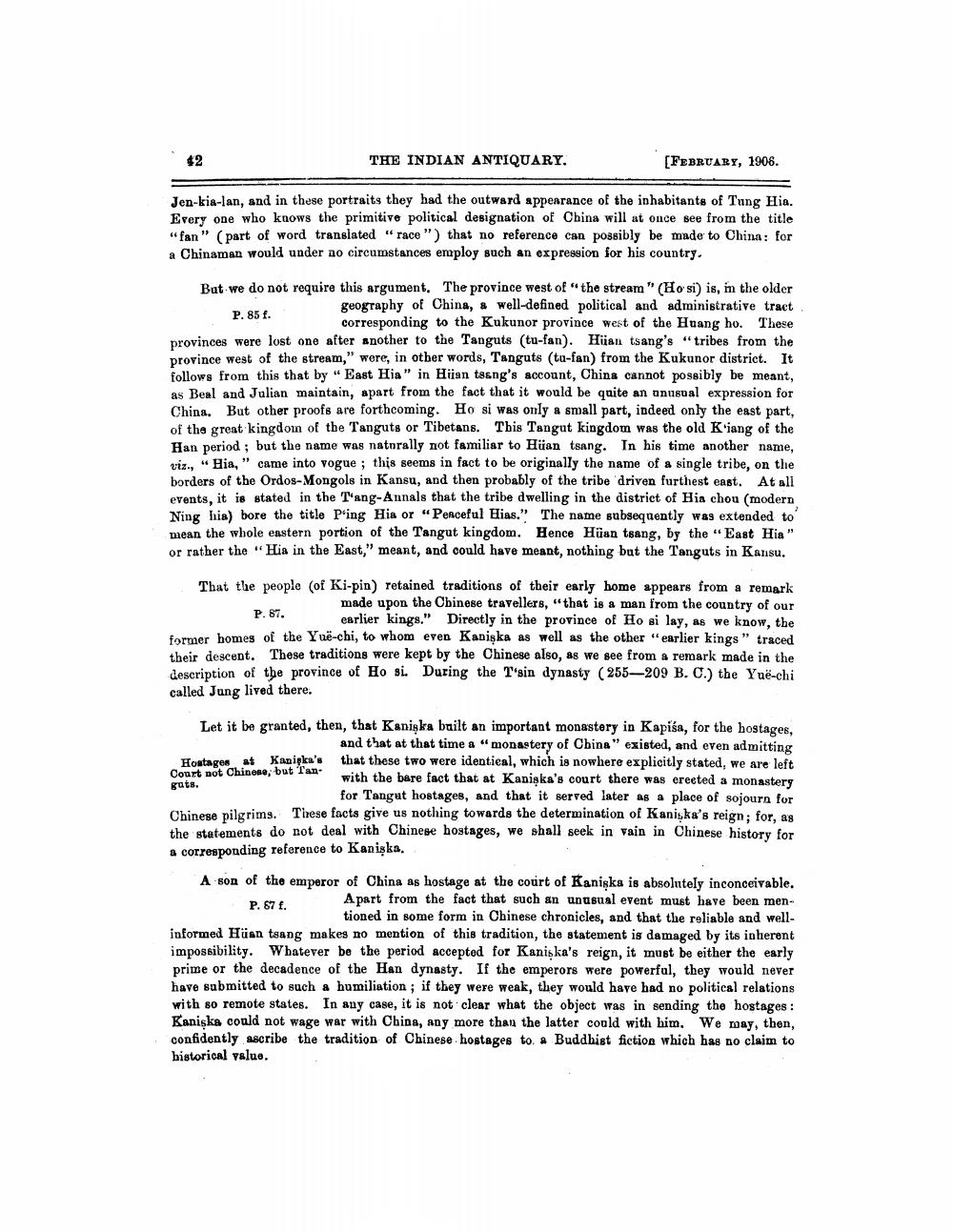________________
THE INDIAN ANTIQUARY.
[FEBRUARY, 1906.
Jen-kia-lan, and in these portraits they had the outward appearance of the inhabitants of Tung Hin. Every one who knows the primitive political designation of China will at once see from the title "fan" (part of word translated "race") that no reference can possibly be made to China: for a Chinaman would under no circumstances employ such an expression for his country.
Bat we do not require this argument. The province west of the stream" (Ho si) is, in the older
geography of China, & well-defined political and administrative tract P. 85 f.
corresponding to the Kukunor province west of the Huang ho. These provinces were lost one after another to the Tanguts (tu-fan). Hiian tsang's "tribes from the province west of the stream," were, in other words, Tanguts (tu-fan) from the Kukunor district. It Follows from this that by "East Hia" in Hiian tsang's account, China cannot possibly be meant, as Beal and Julian maintain, apart from the fact that it would be quite an unusual expression for China. But other proofs are forthcoming. Ho si was only a small part, indeed only the east part, of the great kingdom of the Tanguts or Tibetans. This Tangut kingdom was the old K'iang of the Han period; but the name was naturally not familiar to Hüan tsang. In his time another name, viz., "Hia," came into vogue; this seems in fact to be originally the name of a single tribe, on the borders of the Ordos-Mongols in Kansu, and then probably of the tribe driven furthest east. At all events, it is stated in the T'ang-Annals that the tribe dwelling in the district of His chou (modern Ning his) bore the title Ping His or "Peaceful Hias." The name subsequently was extended to mean the whole eastern portion of the Tangut kingdom. Hence Hüan tsang, by the East Hia" or rather the "Hia in the East," meant, and could have meant, nothing but the Tanguts in Kansu.
That the peoplo (of Ki-pin) retained traditions of their early home appears from a remark
made upon the Chinese travellers, that is a man from the country of our P. 87. earlier kings." Directly in the province of Ho si lay, as we know, the former homes of the Yue-chi, to whom even Kanişka as well as the other "earlier kings" traced their descent. These traditions were kept by the Chinese also, as we see from a remark made in the description of the province of Ho si. During the T'sin dynasty (255—209 B. C.) the Yue-chi called Jung lived there.
Let it be granted, then, that Kaniska built an important monastery in Kapisa, for the hostages,
and that at that time a "monastery of China" existed, and even admitting Hostages at Kanigka's that these two were identieal, which is nowhere explicitly stated, we are left Court not Chinese, but Tan.
with the bare fact that at Kanişka's court there was erected a monastery guts.
for Tangut hostages, and that it served later as a place of sojourn for Chinese pilgrims. Tirese facts give us nothing towards the determination of Kaniska's reign : for. De the statements do not deal with Chinese hostages, we shall seek in vain in Chinese history for a corresponding reference to Kaniska. A son of the emperor of China as hostage at the court of Kanigka is absolutely inconceivable. P. 87.
Apart from the fact that such an unusual event must have been men
tioned in some form in Chinese chronicles, and that the reliable and wellinformed Hüan tsang makes no mention of this tradition, the statement is damaged by its inherent impossibility. Whatever be the period accepted for Kaniska's reign, it must be either the early prime or the decadence of the Han dynasty. If the emperors were powerful, they would never have submitted to such a humiliation; if they were weak, they would have had no political relations with so remote states. In any case, it is not clear what the object was in sending the hostages: Kaniska could not wage war with China, any more than the latter could with him. We may, then, confidently ascribe the tradition of Chinese hostages to a Buddhist fiction which has no claim to bistorical value.




